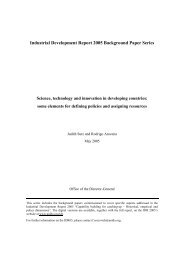Manual on the Development of Cleaner Production Policies ... - Unido
Manual on the Development of Cleaner Production Policies ... - Unido
Manual on the Development of Cleaner Production Policies ... - Unido
Create successful ePaper yourself
Turn your PDF publications into a flip-book with our unique Google optimized e-Paper software.
DEVELOPMENT OF CP POLICY<br />
MODULE 3: CP POLICY DEVELOPMENT CYCLE<br />
ra<strong>the</strong>r than compete, it is crucial to emphasize, at an early stage, <strong>the</strong> importance <strong>of</strong> building c<strong>on</strong>sensus<br />
and identifying a comm<strong>on</strong> goal.<br />
C<strong>on</strong>sensus may refer to <strong>the</strong> method <strong>of</strong> work, for instance commitment that <strong>the</strong> points <strong>of</strong> view <strong>of</strong> <strong>the</strong><br />
various stakeholders will be taken into account, or that <strong>the</strong> private sector should be c<strong>on</strong>sulted when<br />
preparing <strong>the</strong> strategy and <strong>the</strong> acti<strong>on</strong> plan. It may also imply an understanding that each member <strong>of</strong> <strong>the</strong><br />
group will be resp<strong>on</strong>sible for collecting <strong>the</strong> comments and suggesti<strong>on</strong>s <strong>of</strong> <strong>the</strong>ir “home” organizati<strong>on</strong>s.<br />
Ano<strong>the</strong>r agreed principle could be that <strong>the</strong> work will start with identifying priorities that need to be<br />
addressed, ra<strong>the</strong>r than focusing right from <strong>the</strong> beginning <strong>on</strong> <strong>the</strong> mechanisms to solve an issue or <strong>on</strong> <strong>the</strong><br />
availability <strong>of</strong> financial resources. The reas<strong>on</strong> is that even if, at a given moment, <strong>the</strong>re are no funds or<br />
a resp<strong>on</strong>sible instituti<strong>on</strong> cannot be named, <strong>the</strong> issue should be retained <strong>on</strong> <strong>the</strong> agenda, ra<strong>the</strong>r than<br />
removed simply because it is not clear how, or by whom, it should be addressed.<br />
Finally, <strong>the</strong> group may want to stress <strong>the</strong> need to build partnerships for CP promoti<strong>on</strong> (e.g. businessgovernment,<br />
local government-educati<strong>on</strong>al instituti<strong>on</strong>s, etc.). Negotiated soluti<strong>on</strong>s have <strong>of</strong>ten been<br />
shown to work better than enforced soluti<strong>on</strong>s, as <strong>the</strong>y create a higher degree <strong>of</strong> motivati<strong>on</strong> to<br />
implement cleaner producti<strong>on</strong> methods. The private sector would generally be represented at such<br />
negotiati<strong>on</strong>s by industrial organizati<strong>on</strong>s.<br />
Identifying a comm<strong>on</strong> goal will help to ensure that <strong>the</strong> group works in <strong>the</strong> same directi<strong>on</strong>, and that all<br />
actors have an interest in c<strong>on</strong>tributing to <strong>the</strong> work. An important key to establishing a comm<strong>on</strong> goal<br />
and c<strong>on</strong>sensus is for <strong>the</strong> Government to proclaim <strong>Cleaner</strong> Producti<strong>on</strong> a nati<strong>on</strong>al priority. Several<br />
countries have already d<strong>on</strong>e this. The United States Polluti<strong>on</strong> Preventi<strong>on</strong> Act <strong>of</strong> 1990, for example,<br />
states that “The C<strong>on</strong>gress hereby declares it to be <strong>the</strong> nati<strong>on</strong>al policy <strong>of</strong> <strong>the</strong> United States that polluti<strong>on</strong><br />
should be prevented or reduced at source wherever feasible … ”.<br />
EXERCISE<br />
This is a role play <strong>on</strong> <strong>the</strong> resoluti<strong>on</strong> <strong>of</strong> c<strong>on</strong>flicts between stakeholders. Divide <strong>the</strong> group in two halves:<br />
observers and players. The players should include two highly recognized policy specialists from<br />
organizati<strong>on</strong>s <strong>of</strong> opposing views, and <strong>the</strong> rest are policy makers and stakeholders. Invent a relevant<br />
c<strong>on</strong>troversial topic (e.g. a drastic increase in <strong>the</strong> price <strong>of</strong> drinking water to promote savings), and<br />
assign roles for <strong>the</strong> group <strong>of</strong> policy makers (<strong>the</strong>y must approve <strong>the</strong> price hike regardless <strong>of</strong><br />
oppositi<strong>on</strong>). After instructi<strong>on</strong>s to <strong>the</strong> players, <strong>the</strong> roles are played out with a time limit <strong>of</strong> seven to ten<br />
minutes. At <strong>the</strong> end <strong>of</strong> that time, review what happened, how and why. Ask <strong>the</strong> players how <strong>the</strong>y felt<br />
in <strong>the</strong>ir roles, before asking <strong>the</strong> observers for <strong>the</strong>ir views and specifically, what <strong>the</strong>y perceived as<br />
agents <strong>of</strong> change. Proceed to discuss feelings, procedures and substance.<br />
Look for similarities between <strong>the</strong> role play and everyday situati<strong>on</strong>s <strong>of</strong> <strong>the</strong> audience when initiating a<br />
CP policy dialogue.<br />
PAGE 65
















